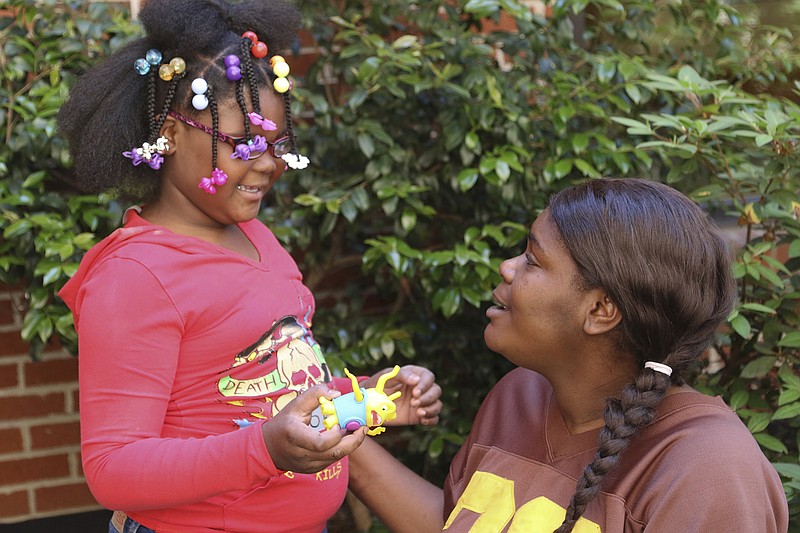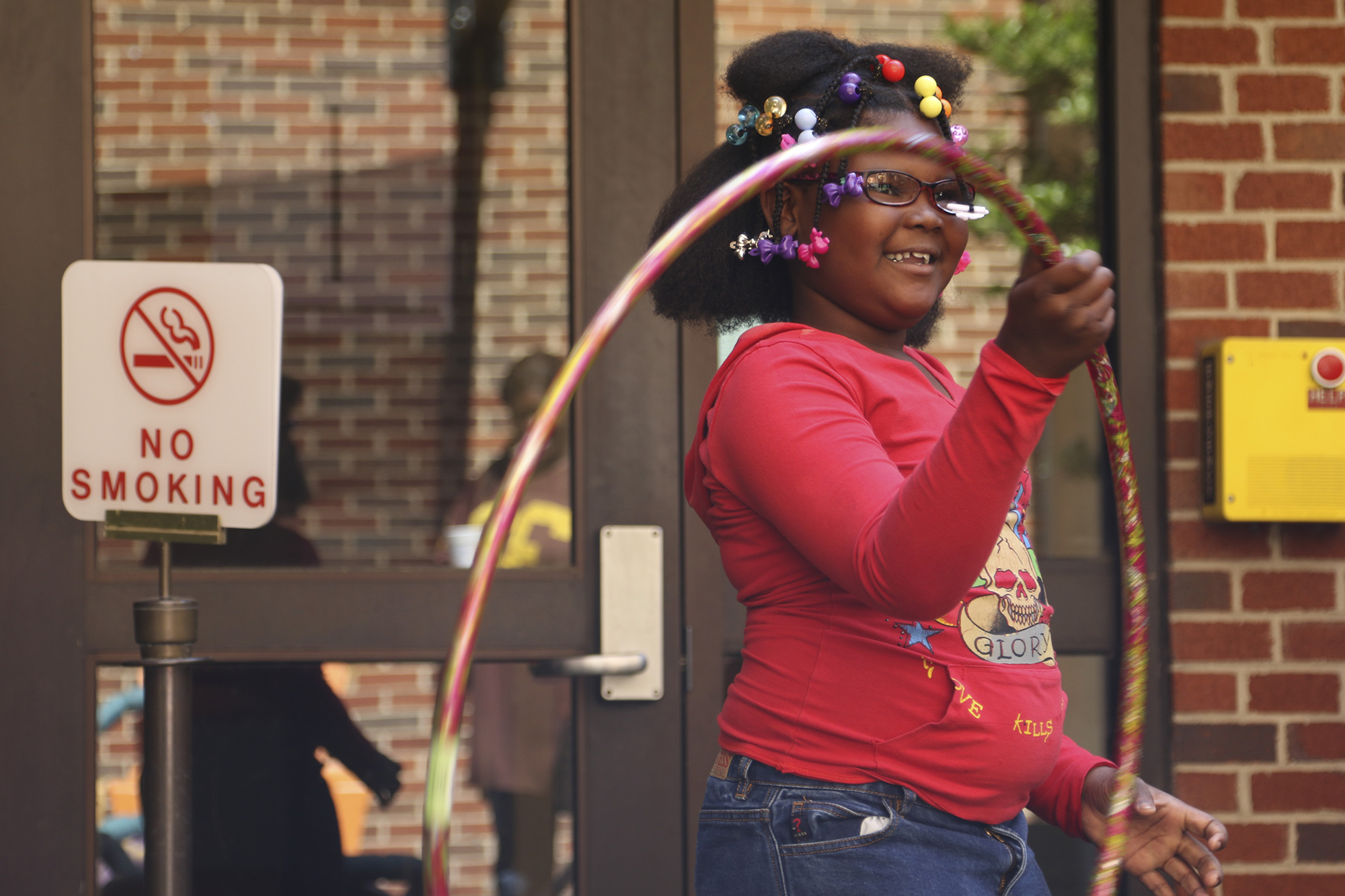Marquita Davis always assumed her kids would grow fast.
Davis and her husband both measure over 6 feet tall. So when the couple's oldest daughter, Kharma, began showing above-average height and weight, her mother was not too worried. Kharma is full of energy -- a headstrong 8-year-old who likes Hula-Hooping and playing outside.
But when Davis' kids switched doctors this year, Kharma's new physician was worried about the second-grader. Her weight was unhealthy for her age, the doctor said, and her blood pressure was high. She faced a growing risk for diabetes and other health problems.
Davis was alarmed. Diabetes runs in both her, and her husband's families.
"I'm just looking at Kharma and thinking, 'Wait a minute,'" said Davis. "She's just a kid. How can she have high blood pressure?'"
That's when Kharma's doctor told Davis about a new option to help the second-grader bring her health in check. Just this January, T.C. Thompson Children's Hospital at Erlanger opened a clinic aimed at helping families fight obesity.
The Childhood Healthy Eating and Active Living Center, shortened to C-HEAL, is one new outpost on the front lines of the region's growing obesity epidemic.
Over the past three decades, childhood obesity has more than doubled in children and tripled in adolescents, the U.S. Centers for Disease Control and Prevention has estimated.
And the outlook for Tennessee children is among the worst in the nation. While the CDC last year heralded a nationwide drop in preschool-age children's obesity rates, Tennessee was one of three states where the problem actually has worsened in the last several years.
"The problem is bad," said pediatrician and C-HEAL Director Dr. Joani Jack. "We consistently rank among the worst."
Tennessee's 20.5 childhood obesity rate outstrips that of neighbor Georgia, at 16.5 percent and Alabama, at 18.6 percent.
And data collected by the Pediatric Healthcare Coalition of the Tennessee Valley on low-income children ages 2 to 5 in Hamilton County found that more than 35 percent are at risk for becoming overweight.
Obesity in young children can set them on track for a wide range of health problems such as cardiovascular disease, diabetes, bone and joint problems and sleep apnea. The disease can also take a psychological toll, leading to depression and anxiety. Left untreated, obesity and the conditions that come with it will stretch into adulthood.
But battling the epidemic can be tough. No single factor leads to obesity, so no single intervention is the silver bullet, says Jack.
"If you try to affect childhood obesity in one sector, such as the doctor's office, it just doesn't work," she said. "You may give a rundown of what they need to change, but in reality, very little actually changes."
What makes a difference, she says, is an approach that goes beyond the doctor's office.
For a child like Kharma, that means linking her and the Davises to real-life resources. Being told to exercise is good, but getting a list of parks and recreation leagues is better. Creative grocery lists and recipes are more effective than a tiresome reminder to eat more fruits and vegetables.
That is where multi-disciplinary childhood obesity centers come in. Such clinics, which have grown more common in the United States over the last five years, are designed to give families a support team so they don't feel alone in the battle against obesity. The clinics are not just geared to helping kids lose weight, but to help families change their lifestyles.
Last fall, the BlueCross BlueShield of Tennessee Health Foundation awarded Erlanger a $375,000 grant to set up Chattanooga's first multi-disciplinary obesity clinic. The center, which opened in January, is staffed by Jack, along with a registered dietician named Jaime Lacey and a community health navigator named Tannia Lascano.
Doctors with a variety of specialties help tailor a plan around each child. Meanwhile, Lascano and Lacey have compiled a bank of available resources in the area to help families make changes: from walking trails to soccer leagues, from produce markets to plant sales.
"In the past, I would say, 'You need to be active an hour a day,'" explained Jack. "Tannia actually digs in and says, 'Here's a park that's three blocks from you. Could you walk there together?' ... She's able to find practical ways to get around barriers."
The clinic is held once a week on Friday mornings, but Jack thinks that more time will be added soon. Already, patients are booked through August.
The clinic has seen a wide range of ages, from 2-year-olds to 17-year-olds, and a variety of ethnic and socioeconomic backgrounds, says Jack. While each child's case is different, many of the culprits leading to obesity are common: more screen time, less physical activity, and meals chock full of sugary, processed foods.
"If they can only change one thing, I always tell them that sugary drinks are it," Jack said. "They are a huge factor in obesity."
She encourages kids to eat five or more fruits or vegetables a day, and redefine portions. The clinic promotes daily breakfast and sit-down family meals as often as possible. To motivate the kids, the clinic also offers incentives, such as passes to a bowling alley, the climbing gym or the Tennessee Aquarium, all donated by those companies.
At Kharma's first appointment at C-HEAL three months ago, Jack and the team talked through the plan directly with the 8-year-old.
"It's not like you go to a regular doctor's appointment and the doctor talks to the parent," Davis said. "They put her in the driver's seat. ... She feels like she is taking charge."
Ask Kharma what she's learned from C-HEAL, and she'll quietly list tips such as "eat seconds of vegetables instead of meat" or talk about how she's learned to do more cartwheels and somersaults. She spends about an hour playing outside every day now.
These days, Davis and her family buy more vegetables and fruits, and they pass over their old favorites, ham and pork, for chicken and turkey sausage. They are working to replace potato chips with homemade banana chips or sweet potato chips. They are frying less and grilling out more.
The C-HEAL team keeps up regular communication with the family, even texting back and forth when parents are grocery shopping. In a way, says Davis, it's like the clinic is treating the whole family.
Just three months in, Kharma is already seeing marked improvement, says Jack.
Progress in the children is measured by body mass index instead of pounds, since simply shedding weight is a problematic goal for growing kids.
Already, Kharma's BMI -- which was rising sharply -- has begun to level off, says Jack. And Davis says she's watched her daughter become empowered.
"I don't think I could have gotten her to do this on my own," Davis said. " [The clinic] just encouraged her and put all these options in front of her. She is now making these choices on her own."
Contact staff writer Kate Belz at kbelz@timesfreepress.com or 423-757-6673.

